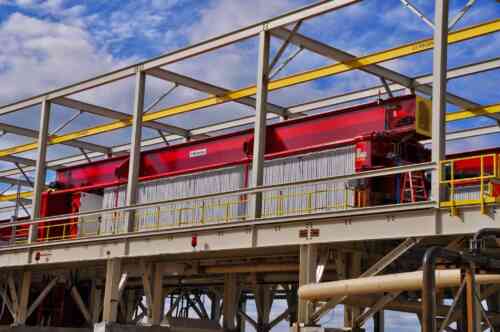MS Industries is a mining research and development company located in northeastern Alabama. They produce high-quality silica sand products, including whole grain silica, silica flour, metakaolin and clay, that are used in everything from oil drilling and foundry products to concrete additives and cosmetics. They also operate a dedicated truck and railcar load-out facility and can ship their products anywhere in the continental United States by truck, water and rail.
CHALLENGE
MS Industries has a good deposit of silica sand at their mine site in Town Creek, Ala., but it contains up to 20% clay in some areas. When they began developing the site in 2016, their biggest goal was to find the best washing system to remove the clay and produce a pure silica product while maintaining a small footprint.
They had to be cognizant of the footprint of the plant itself for two reasons. First, the plant would have to be built on mineable material, so MS Industries wanted to limit the amount of space they would lose to the plant’s infrastructure. Second, the mine is located close to a wetland area, which meant they had to limit their use of settling ponds.
With these requirements in mind, MS Industries began to look for a solution that would help them produce their desired product, as well as manage their clay content.

SOLUTION
“We actually got lucky,” said Clint Carter, Director of Mining Operations at MS Industries. “We were working with a gentleman who had been in the mining industry for many years and he had done some projects with McLanahan on some other sites. He honestly said, ‘Let’s check them out.’”
MS Industries looked at a few options, including belt presses, but ultimately liked the design of the McLanahan Filter Press and McLanahan’s range of equipment offerings.
“One of the factors that we looked at when we were looking at buying from McLanahan was the availability of products,” Carter said. “There’s a lot of companies out there who make one thing — they make a filter press, or they make a pump system or a cyclone. But McLanahan did offer everything that we were looking for. We weren’t piecing together everything. We had everything at once when we needed it.”
MS Industries installed a McLanahan Ultra Sand Plant to separate the clay waste from the sand product, followed by a McLanahan High Density Thickener and Filter Press to recover the process water and solid clay tailings.
Soon after the McLanahan plant was commissioned, MS Industries discovered the material was holding the clay a little more than they originally anticipated. They added a bank of McLanahan Attrition Cells to provide material-on-material scrubbing ahead of the Ultra Sand Plant, as well as a McLanahan Hydrosizer® Plant to help provide flexibility in making the cut of sand.
“One of the biggest benefits working with McLanahan, we were able to work with them directly to come up with a plan for what it is we wanted to do. We gave them a goal that we were after. They helped engineer and design a system that would help meet that goal,” Carter said. “It really ended up being a good partnership and relationship as we worked through the entire commissioning process onto the actual daily running of that equipment.”

RESULTS
Since startup, MS Industries has appreciated the plant’s performance and reliability in helping them to achieve their goals.
“One of the advantages of the McLanahan equipment that we’ve seen, especially on the Filter Press, has been the maintenance,” Carter said. “We’re still on our first set of cloths that were sent with the unit originally. We’ve got a mountain of clay that has been produced by that unit, that if we were not using that Filter Press, would have had to been dug out of ponds and managed on the site. And with the site restrictions of the water, it would have just been a very difficult thing to have to do.”
Carter estimates the McLanahan Filter Press has so far separated about 70,000 tons of clay that alternatively would have had to spend months in a settling pond.
“We don’t have to have settling ponds that we’re constantly having to dig out of it, so it dramatically decreases the footprint of our site,” said Carter.
With the McLanahan Filter Press, MS Industries has turned a waste material into a potentially profitable product. They’ve sold some of the clay as pond lining and dam fill.
“The benefit of the clay is when it comes out of the press, it’s manageable,” Carter said. “It’s dry. I can stack it. I can pile it up, put it in berms. I can use it to my advantage, versus having to constantly deal with it.”
In addition, the McLanahan Filter Press and Thickener have allowed MS Industries to eliminate the need for large ponds or a large water supply, which helps maintain the site’s small footprint. They recover about 96% of the process water for reuse in the wash plant.
“We recycle all of our water,” Carter said. “We have one water discharge point, and it’s actually never discharged water because we don’t need to. We simply are taking every bit of the water that comes into the system and it stays into the system.”
















